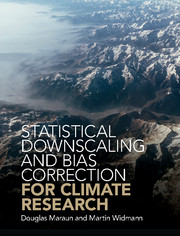Preface
Published online by Cambridge University Press: 27 December 2017
Summary
Statistical downscaling and bias correction are becoming a core element of climate impact studies. They are often intended to and have the potential to inform costly and far-reaching real-world adaptation decisions. The international statistical downscaling community, however, is not organised to meet this challenge, partly because the field is inherently interdisciplinary. Major methodological contributions come from climatologists, impact modellers – in particular hydrologists – and statisticians, all with their different scientific backgrounds, experiences and interests. No consensus exists on the appropriate use and evaluation of different methods; the underlying assumptions are often not explicitly spelled out, rarely are they tested. The downscaling language is, not surprisingly, far from being unified and varies from community to community and region to region.
A number of review articles have been published (e.g. Hewitson and Crane 1996, Zorita and von Storch 1997, Wilby and Wigley 1997, Onof et al. 2000, Fowler et al. 2007, Maraun et al. 2010b, Wilks 2010, Teutschbein and Seibert 2012, Maraun 2016), but some are becoming outdated. They are mostly narrow in scope and in general serve as a literature overview rather than an in-depth introduction to the subject. The IPCC has published a guidelines document on statistical downscaling (Wilby et al. 2004), and one textbook exists on empirical statistical downscaling by Benestad et al. (2008), as well as some book chapters, for example, in Willems et al. (2012). These contributions, however, are limited to some of the approaches in use and provide a mostly technical view of the subject. Other books like the recent contribution by Wilby (2017) cover a broad overview of climate change and society but only briefly lay out the concepts and methods of statistical downscaling. A book that presents the full range of statistical downscaling approaches in some depth and puts these methods into a broader context was missing. Thus, developers and users of downscaling or PhD students starting to work in the field were essentially forced to read review papers, individual papers or book chapters. This book attempts to close this gap.
The first aim of the book is to introduce the main approaches of statistical downscaling – namely perfect prognosis, model output statistics (which is often simply a bias correction), weather generators and some hybrid approaches. We present the most widely used methods that have been developed within these classes and discuss the underlying assumptions and how their structure affects their skill.
- Type
- Chapter
- Information
- Statistical Downscaling and Bias Correction for Climate Research , pp. xii - xivPublisher: Cambridge University PressPrint publication year: 2018
- 1
- Cited by

